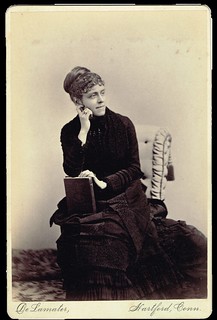“That’s just your luck, Trib. I’ll take your trunk up garret for you again; for of course you won’t go,” Tom remarked, with the disdainful pity which small boys affect when they get into their teens. I was wavering in my secret soul, but that settled the matter, and I crushed him on the spot with martial brevity–
“It is now one; I shall march at six.”
I have a confused recollection of spending the afternoon in pervading the house like an executive whirlwind, with my family swarming after me, all working, talking, prophesying and lamenting, while I packed my “go-abroady” possessions, tumbled the rest into two big boxes, danced on the lids till they shut, and gave them in charge, with the direction,–
“If I never come back, make a bonfire of them.”
Then I choked down a cup of tea, generously salted instead of sugared, by some agitated relative, shouldered my knap sack–it was only a traveling bag, but do let me preserve the unities–hugged my family three times all round without a vestige of unmanly emotion, till a certain dear old lady broke down upon my neck, with a despairing sort of wail–
“Oh, my dear, my dear, how can I let you go?”
“I’ll stay if you say so, mother.”
“But I don’t; go, and the Lord will take care of you.”
Much of the Roman matron’s courage had gone into the Yankee matron’s composition, and, in spite of her tears, she would have sent ten sons to the war, had she possessed them, as freely as she sent one daughter, smiling and flapping on the door-step till I vanished, though the eyes that followed me were very dim, and the handkerchief she waved was very wet.
My transit from The Gables to the village depot was a funny mixture of good wishes and good byes, mud-puddles and shopping. A December twilight is not the most cheering time to enter upon a somewhat perilous enterprise, and, but for the presence of Vashti and neighbor Tom, I fear that I might have added a drop of the briny to the native moisture of–
“The town I left behind me;”
though I’d no thought of giving out: oh, bless you, no!
When the engine screeched “Here we are,” I clutched my escort in a fervent embrace, and skipped into the car with as blithe a farewell as if going on a bridal tour–though I believe brides don’t usually wear cavernous black bonnets and fuzzy brown coats, with a hair-brush, a pair of rubbers, two books, and a bag of ginger-bread distorting the pockets of the same. If I thought that any one would believe it, I’d boldly state that I slept from C. to B., which would simplify matters immensely; but as I know they wouldn’t, I’ll confess that the head under the funereal coal-hod fermented with all manner of high thoughts and heroic purposes “to do or die,”– perhaps both; and the heart under the fuzzy brown coat felt very tender with the memory of the dear old lady, probably sobbing over her army socks and the loss of her topsy-turvy Trib. At this juncture I took the veil, and what I did behind it is nobody’s business; but I maintain that the soldier who cries when his mother says “Good bye,” is the boy to fight best, and die bravest, when the time comes, or go back to her better than he went.
Till nine o’clock I trotted about the city streets, doing those last errands which no woman would even go to heaven without attempting, if she could. Then I went to my usual refuge, and, fully intending to keep awake, as a sort of vigil appropriate to the occasion, fell fast asleep and dreamed propitious dreams till my rosy-faced cousin waked me with a kiss.
A bright day smiled upon my enterprise, and at ten I reported myself to my General, received last instructions and no end of the sympathetic encouragement which women give, in look, touch, and tone more effectually than in words. The next step was to get a free pass to Washington, for I’d no desire to waste my substance on railroad companies when “the boys ” needed even a spinster’s mite. A friend of mine had procured such a pass, and I was bent on doing likewise, though I had to face the president of the railroad to accomplish it. I’m a bashful individual, though I can’t get any one to believe it; so it cost me a great effort to poke about the Worcester depot till the right door appeared, then walk into a room containing several gentlemen, and blunder out my request in a high state of stammer and blush. Nothing could have been more courteous than this dreaded President, but it was evident that I had made as absurd a demand as if I had asked for the nose off his respectable face. He referred me to the Governor at the State House, and I backed out, leaving him no doubt to regret that such mild maniacs were left at large. Here was a Scylla and Charybdis business: as if a President wasn’t trying enough, without the Governor of Massachusetts and the Hub of the Hub on top of that.
